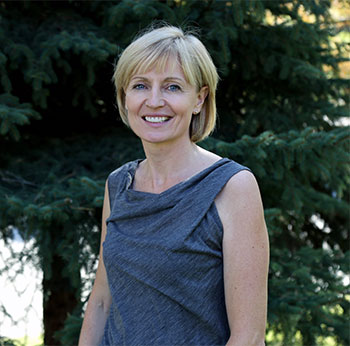ParticipACTION Report Card gives a D+ when it comes to overall physical activity
A UBC Okanagan professor, who is a member of the 2018 ParticipACTION Report Card on Physical Activity for Children and Youth team, is highlighting how important the findings are.

Ali McManus, associate professor in the School of Health and Exercise Sciences.
Released today, the report card gives Canadian kids a score of D+ for overall physical activity.
Associate Professor Ali McManus says this grade is particularly alarming considering that this year’s report card also highlights important connections between physical activity and kids’ brain health. McManus, who teaches in the School of Health and Exercise Sciences, answers some questions about why getting our kids active is vital for many different reasons.
Why is physical activity so important for children and youth?
Improved cognition, such as thinking and learning. For example, students who exercise before a test show stronger brain function than those who don’t, and sections of the brain dedicated to memory and learning are larger in active children. Furthermore, being active can boost memory in kids including those with some brain-based disabilities, such as ADHD and autism spectrum disorder.
Improved mental health, such as better emotional, psychological and social well-being. For example, physical activity is an effective tool in alleviating social and academic stress in young people. Active kids have improved self-esteem, which in turn, may lead to better moods and an overall more positive sense of satisfaction with how they perceive themselves.
Why is the ParticipACTION report card important?
The 2018 ParticipACTION Report Card on Physical Activity for Children and Youth provides the most comprehensive and objective view of how Canadian children live—from physical activity to sleep. It has become a key national indicator of the state-of-the-health of our kids
What are the key findings of the report?
The report card grades tell us:
- D+ for physical activity: Kids aren’t active enough. Only 35 per cent of 5- to 17-year-olds and 62 per cent of 3- to 4-year-olds achieve the recommended physical activity levels for their age group.
- D for sedentary behaviours: Kids are sitting too much, especially in front of screens. Forty-five per cent of 5- to 17-year-olds are meeting the recreational screen time limit of two hours per day. Furthermore, 76 per cent of 3- to 4-year-olds are engaging in more screen time than the one hour per day that is recommended.
- F for overall 24-hour movement behaviours: Kids need to sweat, step, sleep and sit the right amounts each day for optimal health benefits. Only 15 per cent of 5- to 17-year-olds and 13 per cent of 3- to 4-year-olds in Canada meet all these recommendations for their age group.
What can parents/teachers/community members learn from these key findings?
Engaging kids in daily physical activity may be the most accessible, but underutilized, way to support them to better brain health. Here are 10 tips to help kids get active:
- Be active as a family as it encourages togetherness and connectedness, which are all important for good mental health.
- Get kids playing outdoors more as being outdoors is a powerful antidote for adolescents facing stress.
- Explain your child’s strengths and needs to local physical activity and recreation providers so the instructors are better able to include your child in activities.
- Avoid removing opportunities for physical activity and outdoor play as a form of punishment. Movement is vital to their learning development—active kids are more focused and have longer attention spans than sedentary kids.
- Communicate the benefits physical activity has on brain health so everyone is better equipped to support children and youth, including those with brain-based disabilities.
- If you are a healthcare professional, prescribe physical activity to complement the medical course of treatment for anxiety, depression and ADHD among children and youth.
- Educators should teach an active curriculum by breaking up long periods of sitting to help improve thinking and learning, and bolster kids’ resiliency when they are dealing with stress.
- Governments should make physical activity accessible for low-income families and families with children with disabilities to increase their participation in sport and physical activity programs.
- Support or help create policies that mandate physical activity during school or childcare hours and ensure educators receive the training required to implement these physical activity programs.
- Seek funding opportunities to support programming for children and youth with disabilities and to create personalized, accepting and respectful play environments for all.
To download the 2018 ParticipACTION Report Card Highlight Report, including the expert statement, or full report, please visit www.participACTION.com/reportcard.